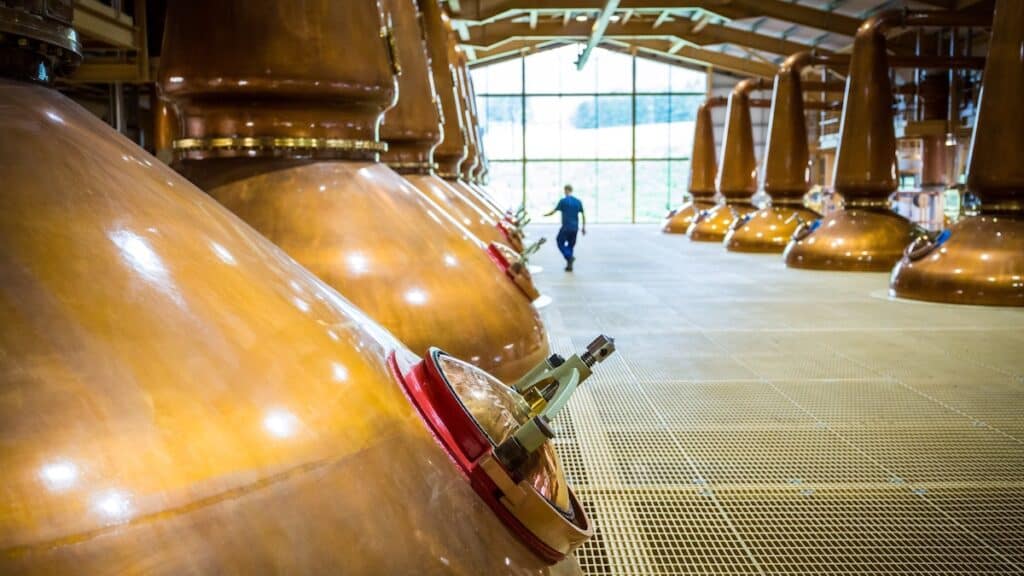
Taking water with your whisky might be an optional extra for drinkers, but using water in your production is a business-critical necessity for whisky distillers. The good news for the sustainability of this historic alcoholic spirit is that new research into nature-based solutions to help tackle water stress in key catchment areas has produced some positive results around a famous Speyside distillery, The Glenlivet.
Scotch industry under pressure from climate change
The Scotch whisky industry is urgently exploring innovative measures to boost and optimise its water resources and reserves, as it comes under intense pressure from climate change impacts, which drive up temperatures and also increase the frequency and likelihood of extreme weather events.
The heatwave in July, for instance, saw temperatures soar across Scotland — and this is no one-off scenario. In fact, many distilleries have had to stop distilling temporarily in recent summers because of water shortages, costing the industry millions.
In response, researchers from the University of Aberdeen and James Hutton Institute have worked with The Glenlivet to introduce environmentally sustainable solutions at the Speyside distillery, which will help to address water scarcity and protect whisky production.
During the dry summer of 2018, groundwater supplies to the distillery itself decreased and did not replenish until the following spring, which is why the potential for positive impacts from water-catchment solutions is so important.
Groundwater recharge via nature-based solutions
Among the nature-based measures implemented are small dams in the landscape supplying the distillery, designed to capture water during wet periods and to make this available when water is scarce.

After initially surveying the landscape to determine where dams would best protect groundwater supplies, the study team used a combination of field data collection and modelling tools to provide insights into how these sustainable solutions actually operated, once in place.
The results confirmed the potential benefits for water management over time, explains project leader and University of Aberdeen PhD student Jessica Fennell:
“The features will have a small but positive impact that could help increase water availability during periods of scarcity and reduce flood peaks during high rainfall. Crucially, this could prevent the distillery closing during dry periods — which has a significant cost impact.“
For whisky production, cool water is key, adds Fennell, who has now had a special Fennell Reserve whisky created by The Glenlivet in her honour:
“Because these measures enhance groundwater recharge, and groundwater contribution to streams, our research has also raised the possibility of positive implications for water temperature. This is important because distilleries require cool water and groundwater is typically colder than surface water during summer.“

Dr Josie Geris, from the University of Aberdeen School of Geosciences, supervised Jessica Fennell and is a co-author of the study, which was funded by the National Environment Research Council (NERC) and Chivas Brothers, owners of The Glenlivet. Other co-authors include Dr Mark Wilkinson from the James Hutton Institute and Dr Ronald Daalmans, Environmental Sustainability Manager at Chivas Brothers. Their findings have been published in the International Journal for River Basin Management.
Commenting on the the wider implications of the findings going forward, Dr Geris said:
“Water scarcity may become a significant issue in Scotland in the future, and here we have shown that these nature-based solutions offer a cost effective, environmentally beneficial approach to water resource management that can be applied to this economically vital sector — there may also be a benefit in terms of securing groundwater supplies.
“The lessons learned can potentially be applied to other areas of the economy that rely on private water supply and bring other potential benefits, for example in flood management, improvements to biodiversity and water quality, the restoration of upland habitats, and carbon storage.”
A commitment has already been made by Chivas Brothers to continue monitoring the effects on water availability at the catchment site in Speyside over the long term, concluded Dr Daalmans:
“Our aim is to ensure all our distilleries operate within the local capacity of their catchment to provide water, particularly during low flows. This research has indicated that the land within the catchment could be used to help mitigate the impacts of climate change on water availability. This is important for the long-term viability of the distillery, but could also benefit the entire Scotch whisky industry, especially in upland areas.“
Further Reading:
- More on the story of The Glenlivet, the distillery and owners Chivas Brothers;
- More about theUniversity of Aberdeen and its School of Geosciences;
- More about the James Hutton Institute;
- More about the National Environment Research Council (NERC);
- Also on SustMeme, Green hydrogen to decarbonise single-malt whisky distillery;
- Also on SustMeme, World’s best-selling whisky to bring sustainability to the bar;
- Also on SustMeme, Waste reduction wins award for alcohol-free spirits;
- Also on SustMeme, Tree-planting punks: First carbon-negative beer business;
- Also on SustMeme, Probably the best… water desalination project in India?
>>> Do you have sustainability news to broadcast and share? If you would like to see it featured here on SustMeme, please use these Contact details to get in touch and send us your Press Release for editorial consideration. Thanks.






